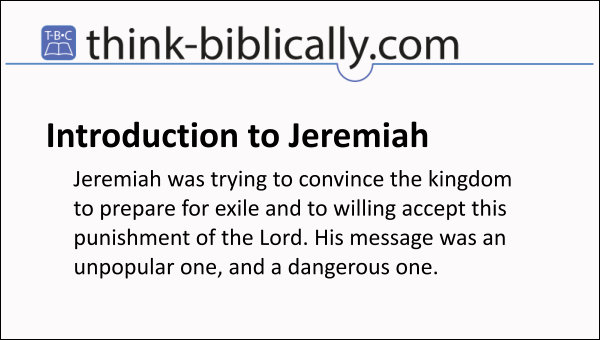By Tyson Thorne

Turmoil had swept across the land like a powerful winter storm. The divided kingdom was functioning, but barely, and all of Israel's existence was on the verge of collapse. King Josiah, though a good king in God's estimation, made the mistake of not preparing the people like Jeremiah was attempting to do. Once Jehoiakim took to the throne in 609 B.C. he immediately set out on the path of the bad kings. He formed an alliance with Egypt and ignored paying the nations "duty" to Babylon, something that would lead to the destruction of the nation and the temple.
The king;s advisers recommended such actions and convinced the people that God would never allow the land to be taken from them, ignoring the people's responsibility to serve God in order to stay in the land. All the while Jeremiah was trying to convince the kingdom to prepare for exile and to willing accept this punishment of the Lord. Needless to say his message was an unpopular one, and a dangerous one. Multiple attempts were made on his life (Jeremiah 11.118-23, 26.8, 38.6) and the king even destroyed one of the prophet's messages (36.20-24).
Author and Date of Writing
There is little dispute that Jeremiah wrote the book that bears his name. His ministry lasted a little over 40 years and what a difficult ministry it was. On it's own, this isn't different from many other prophets. Their words of judgment were rarely welcomed. But Jeremiah was different. When we examine the calling of Isaiah, for example, taken before the throne of God in a vision he hears God ask his heavenly council, "who will go for us?" Isaiah willing responds, "Here I am, send me." This experience isn't unique among the prophets. Jeremiah, on the other hand, was called to his task before he was even formed in the womb (1.5). There was no call, and no choice for Jeremiah to make.
Jeremiah was unique in another way too. He inherited the ministry of Moses. Jeremiah, born to a priest, was both a prophet and a priest like Moses. Jeremiah's initial response to God's mission is one of resistance, just like Moses. God comforts Jeremiah the same way he did Moses, by putting his word's in the prophet's mouth. Nowhere else in Scripture besides with Moses and Jeremiah is this imagery used. So like Moses, Jeremiah's ministry was the ministry of the Word.
The book of Jeremiah is unique as well, as two editions exist. The Masoretic Text is the lengthier version and the text which our Bible's is based on. There is another text, however, found in the Septuagint, which contains only some of what is in our Bibles. Because Jeremiah's ministry was so long, it makes sense that earlier versions of his work were distributed. There is nothing in the Septuagint that isn't in the Masoretic Text, so we can be sure that we have the omplete revelation.
Structure of the Book
i. Introduction, chapter 1
ii. Prophecies against both the Northern and Southern Kingdoms, chapters 2-45
iii. Prophecies against Gentile nations, chapters 46-51
iv. Appendix, chapter 52
